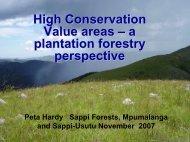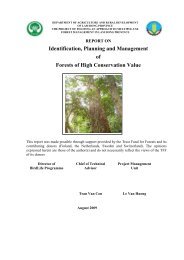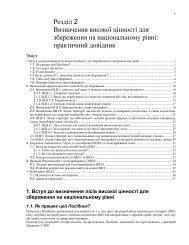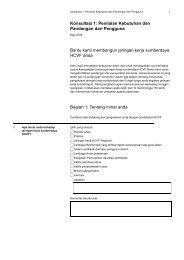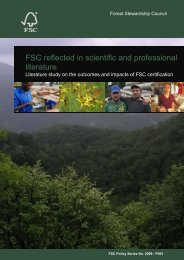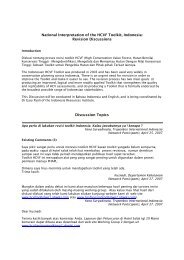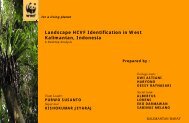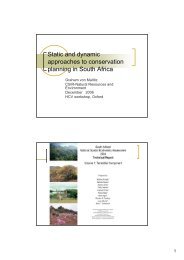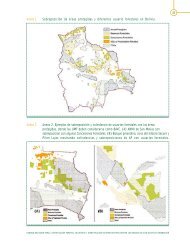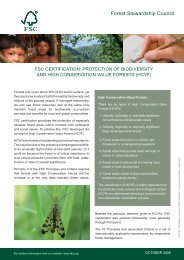Forests Sourcebook - HCV Resource Network
Forests Sourcebook - HCV Resource Network
Forests Sourcebook - HCV Resource Network
Create successful ePaper yourself
Turn your PDF publications into a flip-book with our unique Google optimized e-Paper software.
NOTE 1.4<br />
Property and Access Rights<br />
In many countries, most of the forest estate remains<br />
publicly owned and managed, despite legitimate local<br />
claims to the forests, extensive occupation by agrarian<br />
people, and the limited ability of governments to protect<br />
these vast resources. Legal frameworks and rural land-use<br />
policies often discourage or deny local people’s rights to<br />
own, use, and trade their forest products and services. A<br />
current dilemma is the complementarity between these<br />
frameworks and policies and environmental laws and regulations,<br />
which may evolve with limited attention to tenure<br />
and rights implications.<br />
Development projects promoting agriculture expansion,<br />
large-scale irrigation, and industrial (and mining) development<br />
have often impinged on forest areas and forest inhabitants.<br />
Often, indigenous and forest-dependent communities<br />
do not directly benefit from these activities. Similarly,<br />
forestry projects that deal with industrial and logging concessions,<br />
government-controlled logging quotas, protected<br />
area enlargements, and plantation developments can, if not<br />
appropriately designed and planned, affect tenure and customary<br />
rights of indigenous and other forest communities.<br />
Most of these forestry projects affect traditional forest users,<br />
those with ancestral forest rights, shifting cultivators, and<br />
NTFP gatherers (such as in Cambodia, Lao PDR, and Vietnam).<br />
Operationally, it is difficult to avoid these undesirable<br />
impacts in absence of clarity on tenure and property rights<br />
(see note 1.3, Indigenous Peoples and <strong>Forests</strong>).<br />
Emerging payment schemes and markets for ecosystem<br />
services, such as water flow and biodiversity conservation,<br />
present both similar and special sets of issues for forest<br />
tenure and property rights. Unless done properly, poor people<br />
are less likely to participate in these markets because of<br />
their inability to assume risk, the lack of organization to create<br />
economies of scale, limited land and investment capital,<br />
and often unclear property and use rights. These emerging<br />
markets can be a means for government and local communities<br />
to enhance forest rights in a pilot watershed credits or<br />
a carbon credits scheme and provide complementary technical<br />
support, as well as providing additional returns to<br />
poor producers managing forests on the margin. If not done<br />
sensitively, they can, however, also set dangerous precedents<br />
by introducing new uncertainties—deeming shifting cultivation<br />
or other traditional practices unacceptable, establishing<br />
long-term contracts in regions where forest tenure is<br />
contested, extinguishing traditional use and access, and raising<br />
the price of forests beyond the reach of local people.<br />
Clearly defined rights are essential if the forestdependent<br />
poor are to improve their income and wellbeing.<br />
If individuals, communities, and businesses are to<br />
invest in forest resources, take responsibility for their conservation,<br />
and participate regularly and openly in the marketplace,<br />
they need to be confident of their property rights.<br />
Growing evidence from around the world demonstrates<br />
that recognizing local rights and improving local governance<br />
is politically feasible. It is also a cost-effective strategy<br />
for rural poverty alleviation.<br />
Emerging trends show that more countries are now<br />
actively engaged in reforming their forest land and management<br />
practices. Many communities and Indigenous Peoples<br />
are asserting their rights to manage their forests, and some<br />
governments are introducing substantive changes to forest<br />
tenure and to policies and rules governing markets, and linking<br />
these to agrarian and related sector policies. The forest<br />
sector is now undergoing important reforms, arguably the<br />
most important set of policy and market shifts since the end<br />
of the colonial era, and these present historic opportunities<br />
for, and sometimes threats to, the well-being—livelihoods,<br />
rights, freedom and choices, and culture—of the 1.6 billion<br />
poor people who live in and around forests. These reforms<br />
affect the way in which forest people manage and conserve<br />
forests and affect the provisioning of forest environmental<br />
goods and services that benefit society as a whole.<br />
49



